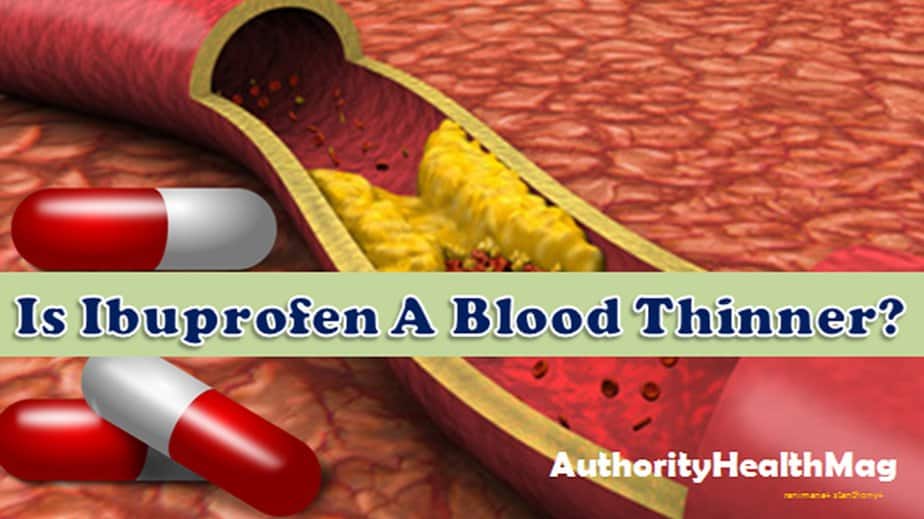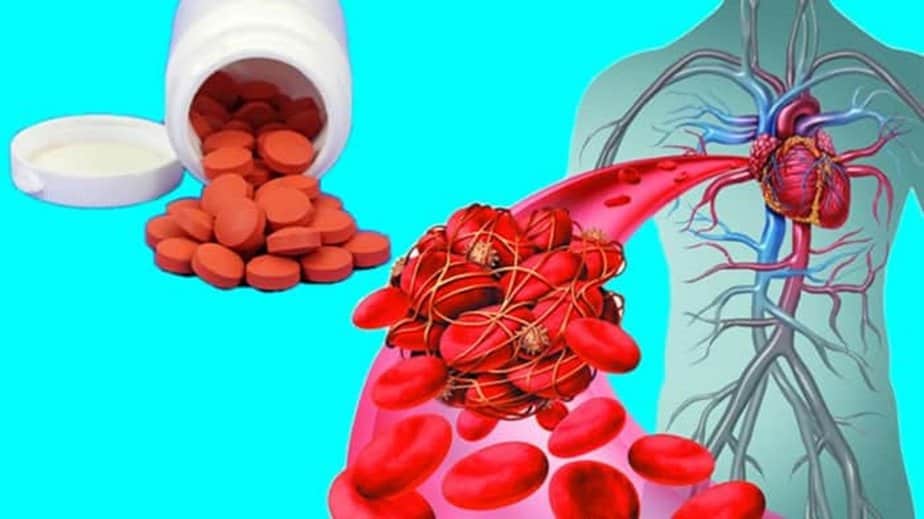Many are genuinely concerned about the blood-thinning effects of this popular painkiller drug.
Blood thinners decrease the chances of blood clotting.
There are several prescription medicines available for blood thinning. If you have an abnormal heart rhythm, your doctor might prescribe one medication.
However, some of the most commonly used medicines, especially long-term use of pain relievers and anti-inflammatory medicines, can have blood-thinning effects as a side effect.
The interaction of different medications could also make your blood low in density or slow down blood clotting.
This article focuses on “Does ibuprofen thin your blood?”
What are blood thinners?
Blood thinners are anticoagulant substances that slow down the normal process of blood clot formation.
Some prescription medications are taken orally or by injection to prevent blood clotting.
Doctors may recommend such medicines for patients who suffer from heart or blood vessel disease or poor blood flow to the brain. They are useful in preventing a heart attack or stroke by removing blood clotting in the arteries and veins.
In most healthy people with a healthy cardiovascular system, regular use of such medicines can put them at risk of bleeding and stomach ulcers.
There are two types: antiplatelets, which prevent the platelets from developing into a clot, and anticoagulants, which slow down the formation of a blood clot.
What is Ibuprofen?
Ibuprofen is an anti-inflammatory medication. It is a common over-the-counter (OTC) drug used for pain relief. In addition to pain management, they are also commonly used to reduce fevers and inflammation.
Ibuprofen has the most favorable GI safety profile of products called nonsteroidal anti-inflammatory drugs (NSAIDs) that block COX enzymes in the body and prevent the formation of prostaglandins. They are used to reduce the hormones that cause inflammation in the body.
Ibuprofen is not a blood thinner. It’s a pain reliever that works well for pain from osteoarthritis toothaches, joint pain, fever, menstrual cramps, and backaches.
According to the Mayo Clinic report, it helps reduce symptoms of inflammation like arthritis (osteoarthritis, rheumatoid arthritis, or juvenile arthritis), such as inflammation, swelling, stiffness, and joint pain. It’s meant for use only until those symptoms subside.
This anti-inflammatory medication comes under brand names like Brufen, Midol, Aleve Motrin, Nurofen, Genpril, Addaprin, Haltran, Naproxen, Nuprin, Proprinal, and Q-Profen.
It is available in the following dosage forms:
- Suspension
- Tablet
- Capsule, liquid-filled
- Tablet, chewable
- Capsule
Is Ibuprofen a blood thinner?
Many anti-inflammatory and pain relief drugs like Ibuprofen, used at the lowest dose, can still have a blood-thinning effect to varying degrees. However, Ibuprofen thins the blood slightly, but not like prescription blood diluters like heparin or warfarin.
Ibuprofen slows down the normal blood clotting rate to some extent. It may increase the bleeding time without altering the viscosity of the blood.
When taking this medication, if you get a cut on your skin, it may take longer for the bleeding to stop.
According to the FDA report, patients receiving Ibuprofen tablets may be adversely affected by alterations in platelet function. While taking this medication, patients with coagulation disorders or taking a blood thinner should be carefully monitored.
Some drug reviews suggest that Ibuprofen produces a blood-thinning effect by interfering with the functions of thrombocytes and interrupting the normal clotting rate of the blood.
This pain reliever medicine may cause similar effects to any medicines for reducing blood viscosity. Talk to your doctor before you start taking anti-inflammatory drugs.
It’s best to use the lowest dose that reduces symptoms. You should stop taking them if the symptoms subside.

Blood thinner medications
All Advil brands like Brufen, Midol, Motrin, and Nurofen can get somewhat thin in the blood. They increase the bleeding by decreasing the potency of the thrombocytes in the blood clotting.
Two types of anticoagulant medications are:
Antiplatelet drugs
Antiplatelet drugs prevent the clumping of platelets and thus decrease the blood clotting power of thrombocytes.
Commonly used antiplatelet medicines are:
- Aspirin
- Plavix
- Effient
- Dipyridamole (Persantie)
- Glycoprotein IIb/IIIa inhibitors
- Clopidogrel (Plavix)
- Ticlopidine (Ticlid)
- Thienopyridines and other ADP receptor blockers
Anticoagulants
Anticoagulant medication is meant for blood thinning and preventing blood clotting for several hours. They open up the blood vessels and increase the flow of blood.
Commonly used or prescribed anticoagulant medications are:
- Warfarin (like Jantoven and Coumadin)
- Apixaban (Eliquis)
- Dabigatran (Pradaxa)
- Enosaparin (like Lovenox)
- Heparin
- Rivaroxaban (Xarelto)
Natural blood thinners
Anticoagulant medications may have some side effects on health in the long run.
Some natural remedies are worth trying if you have cardiovascular disease resulting from blood clotting or closed blood vessels.
Regular exercise
Try to do a minimum of 30 minutes of vigorous exercise daily. Exercises help lower the blood’s vitamin K levels and make the blood slightly thinner.
Omega-3 fatty acids
Consuming omega-3 fatty acids helps balance cholesterol levels in the blood and removes unwanted clots. Fish, walnuts, seaweed, pumpkin seeds, and canola oil are rich in omega-3 fatty acids.
Vitamin E
Eat foods rich in vitamin E, like red bell peppers, Swiss chard, spinach, kale, and almonds. Vitamin E is a fantastic antioxidant that reduces inflammation and blood clotting in the vessels.
Natural antibiotics
Antibiotics have a blood-thinning effect when regularly consumed for a month or more. Some common foods like garlic, onions, olive oil, and jicama contain natural antibiotics that thin the blood.
Water
Keep your body well hydrated by drinking enough water daily; this helps open up the blood vessels and produce low-density blood.
Sunbath
Vitamin D acquired from the sun can increase blood circulation and make the blood slightly thinner. Expose yourself to the morning sun for a couple of minutes to prevent Vitamin D deficiency.
Salicylates
Eating foods such as strawberries, cayenne pepper, honey, cinnamon, oranges, prunes, vinegar, and red wine can supply your body with salicylate chemicals. It helps suppress the blood clotting power of vitamin K and makes the blood somewhat thinner. Aspirin is one of the most commonly used salicylates (18).
Side effects of blood thinners
Regular consumption of medicines that reduce the density of the blood can cause dangerous side effects in most patients.
The risk of bleeding is one of the major consequences of blood-thinning medicines and NSAIDs.
Some of the most commonly found side effects of such medicines are:
- Bleeding gums
- Blood-tinged urine and stool
- Hair loss
- Dizziness
- Excessive bleeding during periods
- Muscle cramps
- Heart failure
FAQs
Is it alright to take Ibuprofen while taking blood thinners?
You should not take Ibuprofen and other blood-thinning medications simultaneously.
Nonsteroidal anti-inflammatory drugs (NSAIDs) may impair the function of platelets, which are essential for blood clotting.
Medications like Warfarin, Enoxaparin, and others used as blood thinners impair blood clotting differently by impacting the INR level.
There is no direct overlap between NSAIDs and specific anticoagulant medications. However, by taking these two medicines simultaneously, you are impairing the body’s ability to do blood clotting in two separate ways. The bleeding risk is higher with them.
Taking NSAIDs and other anticoagulant medications increases the risk of excessive bleeding, which can be fatal.
Never take painkillers and blood thinners simultaneously without the recommendation of your physician.
If interactions between your blood thinner and Ibuprofen lead to adverse effects, you have to look at different options for pain relief.
Is it safe for you to use Ibuprofen?
It is safe to consume Ibuprofen for a short period at the lowest dose possible.
However, the daily consumption of these painkillers and NSAIDs isn’t recommended. Blood thinners raise the risk of bleeding and heart failure.
You should diligently follow the advice of your physician when using any anti-inflammatory medicine.
Never overdose on NSAIDs beyond the daily dosage recommended by your doctor.
Advil, Midol, Motrin, and Nurofen are excellent for curing moderate pain. They do not pose any serious health risks.
However, patients already on prolonged medications should not consume NSAIDs without consulting their doctor. Also, stop taking them if the symptoms subside.
It can increase the risk of general bleeding, especially, stomach bleeding,
You need to stop taking NSAIDs immediately and refer to a doctor if you notice symptoms such as:
- red, black-colored, or tarry stools;
- blood-tinged vomiting;
- severe stomach ache;
- anemia;
- low blood pressure;
- a severe headache;
- tiredness;
- shortness of breath.
Who should not take Ibuprofen or Advil?
Ibuprofen may thin the blood and increase bleeding time, depending on the patient’s health condition. Consult your doctor before taking Ibuprofen with blood viscosity-reducing medicines.
Advil should not be taken daily for an extended period, as it will harm you.
Ibuprofen is not meant for patients with the following health conditions and medication histories:
- already taking aspirin or anticoagulant drugs;
- have any liver diseases;
- suffering from a stomach ulcer;
- allergenic to nonsteroidal anti-inflammatory drugs;
- under medication for cardiovascular diseases.
What is the recommended ibuprofen dosage per day?
Ibuprofen per dose should not exceed 800 milligrams; 400 mg per dose is best.
The physician recommends the dosage depending on the severity of the inflammatory condition. For example, patients with rheumatoid arthritis may require higher doses than those with osteoarthritis.
A healthy adult may consume up to 3200 milligrams daily; 800 mg of pills are taken four times daily.
Ideally, a daily intake of Ibuprofen can range from 1200 to 3200 mg orally daily, divided into equal doses.
Doctors usually recommend taking pain relievers like Ibuprofen at the lowest dose for the shortest time possible until your symptoms subside. If you’re unsure of the correct dosage, consult with your doctor.
This medicine should not be consumed by babies, pregnant women, or breastfeeding mothers.
An overdose of Advil and Motrin has severe side effects, such as:
- upset stomach, mild heartburn, nausea, vomiting;
- dizziness, headache, nervousness;
- bloating, gas, diarrhea, and constipation;
- continuous bleeding;
- mild itching or rash;
- increases the risk of heart attacks.
- Ringing in your ears.
Can I use nonsteroidal anti-inflammatory drugs to prevent blood clotting?
No, even though NSAIDs like Ibuprofen will slightly thin your blood, you shouldn’t take them to prevent clotting. For this purpose, always use prescription medicines like warfarin, Eliquis, Xarelto, or clopidogrel (Plavix).
Does Ibuprofen thin the blood like aspirin?
Aspirin is an antiplatelet drug that stops platelets from clumping together to form blood clots. Ibuprofen is milder than aspirin, which significantly thins the blood. The former may slightly delay the clotting time but does not change the normal thickness of the blood as the latter does. Also, the side effects of aspirin involve a higher risk of bleeding, nausea, vomiting, stomach pain, and heartburn.
The Final Thought
Ibuprofen makes the blood thin, but it is not an anticoagulant medication like warfarin or others that blocks the coagulation proteins in the blood.
Advil does not prevent venous thrombosis. It is an anti-aggregation drug that significantly impacts increased bleeding by slowing down blood clotting.
Ibuprofen is a painkiller and an anti-inflammatory drug that inhibits an enzyme called cyclooxygenase. This particular enzyme creates some of the mediators that cause pain and inflammation.
Ibuprofen also inhibits a similar enzyme that supports the platelets in aggregating and clotting the blood.
Taking a high dosage of these medicines may increase the risk of arterial thrombosis, which leads to the prevention of blood clotting.
Most painkillers in this category have identical effects. Antiplatelet drugs like aspirin also have a blood-thinning effect lasting several days. But paracetamol (acetaminophen in the US) does not impair the function of platelets.
Read Next: Is Tylenol A Blood Thinner
